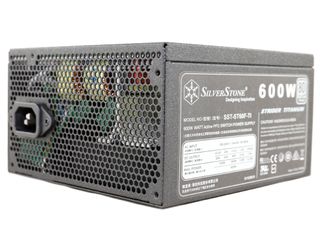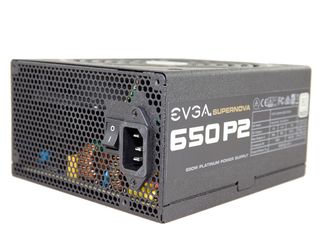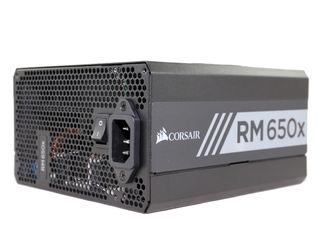Corsair RM650x PSU Review
Another Corsair PSU is in the lab, commanding our attention. We already reviewed the RM750x and RM550x, so we couldn't leave out the RM650x. It promises the same high performance as its siblings, along with super quiet operation.
Why you can trust Tom's Hardware
Load Regulation, Hold-Up Time And Inrush Current And Protections
To learn more about our PSU tests and methodology, please check out How We Test Power Supply Units.
Primary Rails And 5VSB Load Regulation
Load Regulation testing is detailed here.








Hold-Up Time
Our hold-up time tests are described in detail here.







The hold-up time we measured is significantly longer than is needs to be, and the power-good signal drops while the rails are still within spec. This result is good to see; too many competing power supplies fail the same metric. To make matters worse, some manufacturers try cheating. Once their power-good signal drops, the rails are already out of spec, unnecessarily applying higher stress to system components.
Inrush Current
For details on our inrush current testing, please click here.


The inrush current is within normal levels.
Load Regulation And Efficiency Measurements
The first set of tests reveals the stability of the voltage rails and the PSU's efficiency. The applied load equals (approximately) 10 to 110 percent of the maximum load the supply can handle, in increments of 10 percentage points.
We conducted two additional tests. During the first, we stressed the two minor rails (5V and 3.3V) with a high load, while the load at +12V was only 0.1A. This test reveals whether a PSU is Haswell-ready or not. In the second test, we determined the maximum load the +12V rail could handle with minimal load on the minor rails.
| Test # | 12V | 5V | 3.3V | 5VSB | DC/AC (Watts) | Efficiency | Fan Speed | Fan Noise | Temps (In/Out) | PF/AC Volts |
|---|---|---|---|---|---|---|---|---|---|---|
| 1 | 3.580A | 1.985A | 1.989A | 0.995A | 64.77 | 84.90% | 0 RPM | 0 dB(A) | 44.80 °C | 0.965 |
| 12.062V | 5.040V | 3.312V | 5.018V | 76.29 | 38.79 °C | 115.1V | ||||
| 2 | 8.207A | 2.969A | 2.988A | 1.197A | 129.73 | 89.03% | 0 RPM | 0 dB(A) | 48.92 °C | 0.986 |
| 12.048V | 5.038V | 3.311V | 5.012V | 145.71 | 40.07 °C | 115.1V | ||||
| 3 | 13.192A | 3.477A | 3.503A | 1.395A | 194.84 | 90.28% | 0 RPM | 0 dB(A) | 49.91 °C | 0.992 |
| 12.034V | 5.036V | 3.310V | 5.006V | 215.81 | 40.34 °C | 115.1V | ||||
| 4 | 18.188A | 3.975A | 3.988A | 1.598A | 259.79 | 90.72% | 0 RPM | 0 dB(A) | 52.21 °C | 0.994 |
| 12.019V | 5.033V | 3.308V | 5.000V | 286.38 | 40.90 °C | 115.2V | ||||
| 5 | 22.848A | 4.969A | 4.988A | 1.801A | 324.76 | 90.37% | 0 RPM | 0 dB(A) | 53.81 °C | 0.995 |
| 12.004V | 5.031V | 3.307V | 4.995V | 359.36 | 41.72 °C | 115.1V | ||||
| 6 | 27.525A | 5.966A | 5.989A | 2.001A | 389.71 | 89.77% | 620 RPM | 22.0 dB(A) | 43.10 °C | 0.996 |
| 11.987V | 5.027V | 3.305V | 4.989V | 434.13 | 53.87 °C | 115.1V | ||||
| 7 | 32.202A | 6.971A | 6.994A | 2.205A | 454.66 | 89.39% | 620 RPM | 22.0 dB(A) | 43.78 °C | 0.997 |
| 11.973V | 5.023V | 3.303V | 4.983V | 508.63 | 54.95 °C | 115.1V | ||||
| 8 | 36.900A | 7.969A | 7.998A | 2.410A | 519.61 | 88.86% | 710 RPM | 22.8 dB(A) | 44.13 °C | 0.997 |
| 11.957V | 5.020V | 3.300V | 4.977V | 584.77 | 55.54 °C | 115.2V | ||||
| 9 | 42.050A | 8.473A | 8.517A | 2.410A | 584.72 | 88.29% | 920 RPM | 27.9 dB(A) | 45.37 °C | 0.997 |
| 11.941V | 5.017V | 3.299V | 4.975V | 662.24 | 57.08 °C | 115.1V | ||||
| 10 | 46.940A | 8.978A | 9.005A | 3.022A | 649.47 | 87.54% | 1100 RPM | 33.3 dB(A) | 47.83 °C | 0.997 |
| 11.925V | 5.015V | 3.298V | 4.959V | 741.91 | 60.08 °C | 115.1V | ||||
| 11 | 52.461A | 8.981A | 9.009A | 3.025A | 714.52 | 86.72% | 1315 RPM | 38.3 dB(A) | 49.12 °C | 0.997 |
| 11.910V | 5.013V | 3.296V | 4.956V | 823.95 | 61.71 °C | 115.1V | ||||
| CL1 | 0.100A | 16.025A | 16.005A | 0.004A | 134.76 | 82.71% | 690 RPM | 22.5 dB(A) | 46.56 °C | 0.988 |
| 12.040V | 5.020V | 3.317V | 5.070V | 162.94 | 55.18 °C | 115.1V | ||||
| CL2 | 54.124A | 1.003A | 1.003A | 1.002A | 658.69 | 88.09% | 1100 RPM | 33.3 dB(A) | 47.54 °C | 0.997 |
| 11.923V | 5.027V | 3.299V | 5.005V | 747.73 | 59.37 °C | 115.1V |
Besides quiet operation, even under extremely tough conditions, the RM650x also features tight load regulation on all of its minor rails. Load regulation is merely satisfactory on the +12V rail though; we'd like to see within 1% deviation, especially since we measured an amazing 0.49% on EVGA's 650 P2. Price-wise, that's a direct opponent.
Even at high ambient temperatures, the RM650x satisfies the 80 PLUS Gold requirements. Corsair takes the specification seriously, and prefers to be conservative with its ratings. In our opinion, that shows a lot of respect for its customers.
The PSU's fan starts to spin during our 60% load test. It takes the full load test to get it above 1000 RPM. Even in a worst-case 110% load scenario, the fan doesn't exceed 40 dB(A). We should also mention that, despite our best efforts, we couldn't get the fan rotating at full speed. This is the same fan used in Corsair's RM1000x and it easily covers that model's needs. It should come as no surprise that a 650W power supply presents less of a challenge.
Current page: Load Regulation, Hold-Up Time And Inrush Current And Protections
Prev Page A Look Inside And Component Analysis Next Page Efficiency, Temperature And NoiseStay on the Cutting Edge
Join the experts who read Tom's Hardware for the inside track on enthusiast PC tech news — and have for over 25 years. We'll send breaking news and in-depth reviews of CPUs, GPUs, AI, maker hardware and more straight to your inbox.
Aris Mpitziopoulos is a Contributing Editor at Tom's Hardware US, covering PSUs.
-
maxwellmelon for all the good listed in this article, this series of psu just gets bashed in the fourms, just interesting.Reply -
basroil Reply18305746 said:for all the good listed in this article, this series of psu just gets bashed in the fourms, just interesting.
You're thinking of the older RM650, different design.
The review here just made this unit be one of my recommended 650 models, tied with the EVGA G2/P2 and just below the Seasonic 660XP2! -
pjc6281 I have had this PSU for my new Skylake build for 2 months. Its GREAT, quiet and even have it pushing my old dinosaur Nvidia 590 with no problems. My old power supply was a Corsair AX1200 that was rock solid as well. Nothing but good experiences with them. I know others differ.Reply -
Dark Lord of Tech ReplyRMX doesn't get bashed , RMX and RMI are very very good. I own the RMX 850 , GREAT UNIT. -
TechyInAZ I'm glad the new RM series is much higher quality. All I remember Corsair having is a bunch of bad PSUs with select few good PSU (like AX and HX).Reply
I hope this same kind of quality intros into other models like the newly refreshed CX PSUs. -
Reply18305746 said:for all the good listed in this article, this series of psu just gets bashed in the fourms, just interesting.
Yeah, I believe you are confusing the RMx and RMi with the older, mostly discontinued RM line. And of the old RM line only the 750w and 850w versions that were first made by Chicony Power Technology had the bad reputation. Anyone bashing the RMx and RMi doesn't know what they are talking about. Once misinformation gets out there it's hard to get it corrected though.
Another great review Aris! :) -
Reply18308072 said:Why buy Corsair or EVGA when you can get a Seasonic?
Seasonic doesn't have a lock on quality. They also don't offer a 10 year warranty which both Corsair and EVGA do on some models. Just off the top of my head Flextronics, CWT and SuperFlower are all capable of making units that are at least equal to high end Seasonic quality. There are others as well. -
TechyInAZ Reply18308188 said:18308072 said:Why buy Corsair or EVGA when you can get a Seasonic?
Seasonic doesn't have a lock on quality. They also don't offer a 10 year warranty which both Corsair and EVGA do on some models. Just off the top of my head Flextronics, CWT and SuperFlower are all capable of making units that are at least equal to high end Seasonic quality. There are others as well.
Plus, efficiency levels are typically better with EVGA than Seasonic. -
Reply18308342 said:18308188 said:18308072 said:Why buy Corsair or EVGA when you can get a Seasonic?
Seasonic doesn't have a lock on quality. They also don't offer a 10 year warranty which both Corsair and EVGA do on some models. Just off the top of my head Flextronics, CWT and SuperFlower are all capable of making units that are at least equal to high end Seasonic quality. There are others as well.
Plus, efficiency levels are typically better with EVGA than Seasonic.
:??: Not sure what you mean. EVGA has a couple of 80 Plus Titanium models but Seasonic has Titanium models in their new lineup. I'm not sure if those new Seasonic models are available yet though. Other than that I've had an 80 Plus Platinum Seasonic ( 660XP2 ) for a couple of years and their Platinum line has been out since at least 2011.


